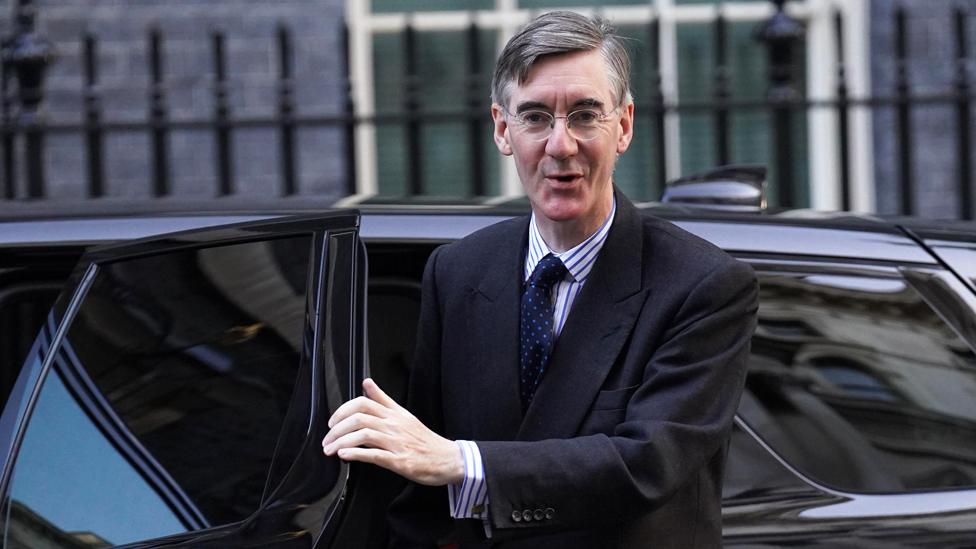Investors nervous as market sell-off intensifies
- Published
Bank boss tells the BBC it is doing 'everything' to ensure financial stability
The turmoil on UK financial markets has intensified after the Bank of England insisted its emergency bond-buying scheme would come to an end this week.
The cost of government borrowing over 10 years briefly surged to its highest level since 2008, as investors demanded higher returns to lend to the UK.
The Bank has been buying government bonds to prevent a sell-off which could put some pension schemes at risk.
On Wednesday it stressed this help would end on Friday come what may.
The Bank first stepped in last month after promises of huge, unfunded tax cuts in the chancellor's "mini-budget" sparked a dramatic reaction on financial markets.
The pound hit a record low and bond prices fell sharply, forcing the Bank to promise to buy up to £65bn of government bonds to support their price. So far it has only spent around £10bn of this pledged amount.
But while the intervention initially worked, bond yields - in other words the interest rates the government pays to investors - are now close to or above the highs seen straight after the mini-budget.
On Wednesday, government borrowing costs over 20 and 30 years both hit their highest levels since 2002.
The Bank increased bond-buying in response as it battled the sell-off.
The pound remained stable at $1.10 against the US dollar.
The movements came after Bank of England Governor Andrew Bailey bluntly told pensions funds they had "three days left now and you've got to sort it out".
Fiona Cincotta, market analyst at City Index, said "those words seemed to hit the market quite hard" with the pound falling.
If there is further market turmoil on Monday after the Bank pulls out on Friday, "Andrew Bailey has put himself in a very tight corner there", she said.
"If this does all break loose on Monday, and we have a very risky financial position, what are the Bank of England going to do? And I think they will need to step in."
'IMF is wrong'
Investor concerns about the mini-budget were heightened by the lack of a forecast by the independent financial watchdog the Office for Budget Responsibility (OBR).
However, on Wednesday Business Secretary Jacob Rees-Mogg told ITV's Robert Peston that the OBR's "record of forecasting accurately hasn't been enormously good" and that "there are other sources of information".
He also hit back at the International Monetary Fund (IMF) which had openly criticised the government's tax cut plans, saying they were likely to increase inequality, and that the plans would "complicate the fight" against soaring prices.
He said: "I think the IMF is wrong on both counts. I think it's particularly wrong on energy, and frankly doesn't know what it's talking about.
"The IMF is not holy writ and the IMF likes having a pop at the UK for its own particular reasons. I'm afraid I would never lose too much sleep about the IMF."
What are bonds?
The UK government raises money it needs for spending by selling bonds - a form of debt that is paid back plus interest in anywhere between five and 30 years.
Pension funds invest in bonds because they provide a low but usually reliable return over a long period of time.
However, the sharp fall in their value after the mini-budget forced pension funds to sell bonds, threatening to create a "downward spiral" in their prices as more were offloaded, which left some funds close to collapse.
Earlier, pensions industry body the Pensions and Lifetime Savings Association had warned the Bank against the help ending "too soon".
It suggested the support should be extended until 31 October, when chancellor Kwasi Kwarteng is due to detail his economic plan explaining how he will balance the public finances. The statement will be accompanied by independent forecasts on the prospects for the UK economy.
Mr Bailey told the BBC he had stayed up all night to try to find a way to calm markets and said the Bank was doing everything it could to preserve financial stability, but said it had always been clear that the help would be temporary.
"I'm afraid this has to be done, for the sake of financial stability," he added.
The recent turmoil has fed through to the mortgage market, where hundreds of products have been suspended as the volatility has made it difficult for lenders to know how to price these long-term loans.
Last week, interest rates on typical two and five-year fixed rate mortgages topped 6% for the first time in over a decade.
On Wednesday, the Bank said this was likely to put households under severe pressure next year. The number having to spend 70% or more of their disposable income on mortgage rates and essentials is set to reach its highest level since before the financial crisis in 2008, it said.
The government has said it remains confident in its tax cut plan, with Mr Kwarteng telling MPs he was "relentlessly focused on growing the economy" and "raising living standards".
But Mr Bailey's words further increase the pressure on the government, and the chancellor, to come up with an economically credible and politically viable debt plan, and quickly.
Labour's shadow chancellor Rachel Reeves said: "This is a Tory crisis that has been made in Downing Street, and that is being paid for by working people."
Former IMF deputy director Mohamed El-Erian told BBC News that the economy was on "shaky ground".
In its latest World Economic Outlook report on Tuesday, the IMF acknowledged the mini-budget would "lift growth somewhat in the near term", although it would "complicate the fight" against the cost-of-living crisis.
Related topics
- Published12 October 2022
- Published12 October 2022

- Published11 October 2022
